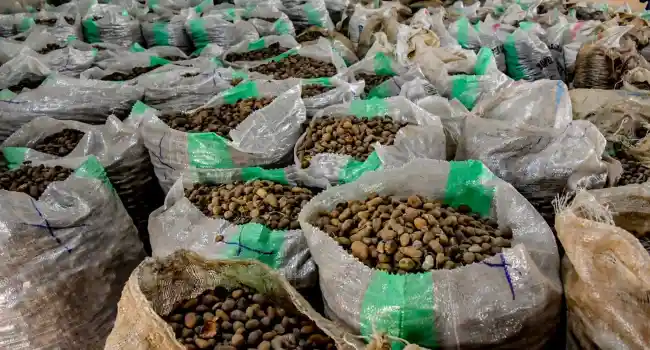President Bola Ahmed Tinubu has ordered an immediate six-month ban on the export of raw shea nut, a policy targeted at strengthening Nigeria’s shea value chain, boosting local processing, and positioning the country as a global supplier of refined shea products.
The directive, which takes effect immediately, was announced on Tuesday, August 26, 2025, by Vice President Kashim Shettima during a multi-stakeholder meeting at the Presidential Villa in Abuja.
TJ News Nigeria reports that the decision, though temporary, is subject to reviewers upon expiration and is expected to generate about $300 million annually in the short term while securing raw materials for local processors.
Why the Ban Was Introduced
Vice President Shettima explained that the measure was not an anti-trade restriction but a “pro-value addition policy” meant to protect domestic processors and enable industries to run at full capacity.
According to him, Nigeria accounts for nearly 40% of global shea production but controls just 1% of the $6.5 billion market share. This, he said, was unacceptable.
Key reasons behind the ban include:
- Curtailing informal cross-border trade of over 90,000 metric tonnes of raw shea annually
- Protecting Nigerian processors, currently operating at only 35–50% capacity despite a national installed capacity of 160,000 metric tonnes
- Creating opportunities for rural income generation, women empowerment, and job creation
- Transforming Nigeria from an exporter of raw shea nut to a global supplier of refined shea butter, oil, and other derivatives
Shettima stressed that the initiative aligns with the government’s industrialisation agenda and would also expand Nigeria’s trade footprint globally.
Women Empowerment and Economic Transformation
The Vice President highlighted the gender dimension of the policy, noting that 90% of shea pickers and processors are women.
“By protecting the shea industry, we are protecting livelihoods, dignity, and opportunity for millions of our women,” he said.
He further disclosed that Nigeria was working with Brazil to prioritize access for Nigerian shea butter and oil in the Brazilian market within the next three months, a move expected to boost exports and open new trade routes.
Minister of Agriculture’s Perspective
The Minister of Agriculture and Food Security, Abubakar Kyari, said Nigeria produces about 350,000 metric tonnes of shea annually across 30 states, with the potential to reach 900,000 metric tonnes.
Despite this, Nigeria captures less than one percent of the multi-billion-dollar global shea economy, unlike countries such as Ghana, Mali, Burkina Faso, and Togo, which have already imposed restrictions on raw shea exports to protect their industries.
Kyari said:
- Without action, Nigeria risked being left as a “raw depot” for opportunistic buyers
- The shea sector could generate over $300 million annually in the short term
- By 2030, Nigeria could secure a significant share of the projected $9 billion global market
He added that investment in the shea industry directly supports the government’s Zero Oil Plan to diversify exports and reduce dependence on crude oil.
Key Benefits of the Temporary Ban
According to government officials, the immediate benefits of the ban include:
- Securing domestic supply of raw shea for local processors
- Reducing informal exports and illegal trade losses
- Boosting rural income through sustainable shea production
- Enabling processors to operate at full capacity and create jobs
- Positioning Nigeria globally as a refined shea products supplier
Related:






